As a full time, real estate professional my passion and focus guides me every to day following a conservative investment model on residential property in Germany. Nevertheless, over the past 7 years since, I ventured into the world of Bitcoin which by now understand as comparable and even superior asset in many regards. Why?
Well, most people, including myself use real estate investment as a store of value asset and accordingly, most have a long term if not lifelong exposure to this asset. On the other hand, Bitcoin has been proving itself over the last 14 years as a new form of digital property showing extraordinary Store of Value characteristics. What are those characteristics? And how will this play out over time? We will try to discuss.
Many of my friends and Real Estate associates, and newbies have asked me: “Hügi, why should I care about this magic internet money?”
I confess that my answer has varied according to the lecture or podcast du jour. Some of my explanations were better than others, and some successfully led to orange-pilling (converting to Bitcoin) a few very smart people. But some of my explanations were epic fails due to excessive faith coupled with lack of knowledge. Meanwhile, I kept on studying, testing, learning.
This is my current attempt to classify and share my most powerful observations and thoughts regarding Bitcoin. Just maybe, I will convince you to delve deeper into the subject.
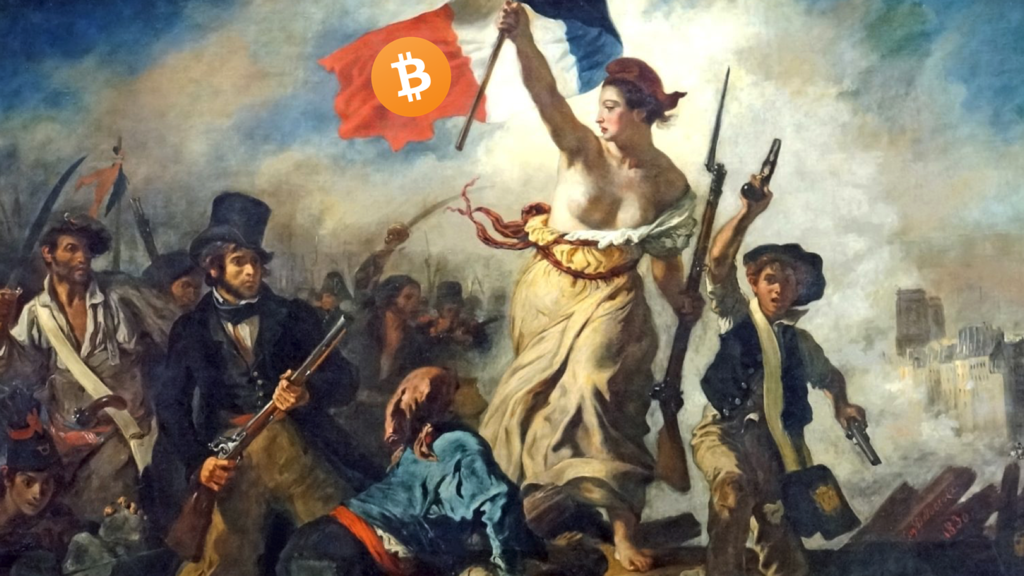
Liberty leading the Bitcoin People – Painting by Eugene Delacroix (1830)
Bitcoin’s most important Property: Sovereignty.
It will require anywhere from ten to a thousand or more hours of research to finally see the light about Bitcoin. But once it clicks, you can’t un-see it. I confess that, back in 2015, it took me about a hundred hours to understand the importance of this concept and how it will change the world.
Most Real Estate people are simply too busy to make time for this arduous task in uncharted waters. The thinking is: Bitcoin doesn’t matter enough to make it a priority to study.
Oh dear friend, how wrong one can be! Bitcoin matters, it matters a lot. In fact, it matters more than most of us will ever comprehend.
I will not attempt to explain the technology, because it is beyond my competence. But in a nutshell, if the internet is a technological protocol which allows to transfer Information using electricity, Bitcoin is a protocol which allows to transfer value using electricity. Crucially, Satoshi Nakamoto, the mysterious creator of Bitcoin built it in a way that allows transactions with no intermediary. In other words, it replicates the way humans have always transacted: from one sovereign entity to another.
Alice and Bob
How it used to be:
Alice has a stone; Bob has a fish. Alice wants the fish and Bob wants the stone. Transaction happens. Now Alice has a fish but no stone; Bob has a stone and no fish.
Simple & efficient right? This what we can define as a pure peer-to-peer sovereign transaction. We’ll get back to this idea in a bit.
How does transacting basically work today?
What is money? As explained to a 5-year-old…
Alice thinks she has a stone because The Bank says they are holding the stone in safe keeping for Alice. Bob thinks he has a fish because The Bank says they are holding it safe for Bob.
Transaction happens.
The Bank tells Alice she has acquired the fish from Bob and also tells Bob he has received the stone from Alice. But it is so? In other words, our current system relies heavily on trust and the honesty of the bank as custodial intermediary.
Effectively speaking, Alice and Bob never sovereignly exchanged their belongings, nor can they really ever know if The Bank is telling the truth. This type of exchange creates a potential point of failure.
Now back to real estate property, things get complicated…
Replace Alice by the seller, Bob by the buyer, then beef up The Bank and transform them into a network of profit-seeking banks, lawyers, accountants; CPAs, regulators (land register, municipalities, councils, etc.) plus of course notaries, and you get a shorthand for a Real Estate Transaction today in all its glorious complexity.

Ownership of a home is a dream for most people because it stores your value and protects you
You don’t own property, ever…
A shocking insight I had a few years ago: in a very real way, no private individual or entity, ever truly owns property. But how, why? If any owner defaults on paying property taxes, there local government will seize their property.
That means effectively what we call ownership is rather as form of disguised infinite tenancy to the government via property taxes. If that is the case, are you really the owner of the property? No. You may think you own it, but if someone can take it from you when you don’t pay them, is it really yours?
Bitcoin, on the other hand is designed as the only asset ever created that is truly, fully, sovereignly own-able because technically Bitcoin even though it is digital in nature, it is a bearer instrument (like cash) and transaction are settled every 10 minutes. What do we mean by this?
Like Alice and Bob exchanging their fish and stone directly from one to the other, Bitcoin has no individual intermediaries to process transactions. Instead, Bitcoin relies on a swarm-type network of connected nodes (computers), constantly auditing each other. Therefore, the transaction has, no single points of failure or potential reversals, limiting and crucially cannot be banned.
Bitcoin is arguably the only pure Peer-to-Peer transaction network in the world. Therefore, it constitutes a purer form of property than Real Estate. You actually own Bitcoin.
Therefore, from an ownership perspective Bitcoin is actually better property than property.

Scarcity: if 5 people fight for a good, its price will rise up.
Bitcoin a commodity? No, even better it’s a Scarcity.
A Commodity is an economic good or resource which is emergent from nature (corn, lumber, iron or, oil etc.) and therefore is not subject to board of directors or a founder.
In 2015, the U.S. Commodities Futures Trading Commission (CFTC) defined Bitcoin as a commodity, under the U.S. Commodity Exchange Act. In 2022, this categorization was reconfirmed officially by Gary Gentler, Chair of the Securities and Exchange Commission (SEC). Why does this matter?
Well, mainly because Bitcoin is recognized not to be subject to the influence of any party. In other words, it is less risky than any other crypto. Furthermore, because history teaches us that overtime the best money always trends towards the scarcest commodity that is durable, portable, divisible & auditable.
Secondly, the US Internal Revenue Service (IRS) classifies Bitcoin as property when it comes to taxation. In Germany and Portugal and a few other countries, Bitcoin is capital gains tax-free if you hold it for longer than 12 months.
Bitcoin is defying the rules, even inventing new words. In 2022, famed Bitcoin institutional bull, Michael Saylor, coined a new term: a Scarcity. The definition was proposed by him in his December 2022 interview of The Bitcoin Matrix.
“A scarcity is a commodity whose supply is absolutely scarce, forever”.
Specifically, Bitcoin is programmed to generate a fixed FINITE supply of 21 million Bitcoins (BTC). In other words, BTC is the first and only commodity in human history to have a built-in finite supply. In fact, the supply of BTC is diminishing overtime because private keys will get lost over time.
Historically, the banking and financial worlds have not experienced a truly scarce commodity because, you can always grow more cotton, corn or lumber, dig for oil and gas, mine for iridium, cobalt and gold, etc.
But in Real Estate terms, this concept is easy to understand. Unique, rare and well-designed properties are more desirable. Because they are scarce. Full stop… However, in Real Estate, one can often build more or higher structures or expand an existing property. Bitcoin is superior, because its scarcer.
Again, from a scarcity perspective Bitcoin is better property than property.

Digital things are things: Code is speech
It never rains in Cyberspace
Besides the government’s relentless nibbling away at your property via taxes, we know that physics also plays a crucial role in Real Estate ownership. The Second Law of Thermodynamics teaches that all systems inexorably deteriorate over time. The technical term for this phenomenon is entropy or decaying.
Entropy is well understood by any Real Estate owner and constitutes an important element of any serious business plan. Simply said, things break down over time: walls and roofs age, pipes will fissure, toilets clog, electricity needs upgrading, flooring gets traffic damage, etc. Need I go on?
Assuming your property foundation is solid, and you are not located on a coastal region affected by regular erosion, every decade or so you will nonetheless need to conduct extensive internal and external renovation of your building’s systems: heating, plumbing, water mains, electricity, telecom etc.
Tax codes generally acknowledge this notion by granting owners tax breaks for property depreciation (a.k.a. entropy) over time (from 2% to 8% of asset value per year), because they are well aware that things and systems break down over time. Land is usually exempt, however, because it doesn’t deteriorate, unless affected by erosion or flooding.
On the other hand, entropy does not affect digital property. Simply put, it never rains in cyberspace. Mario Bros. may be plumbers, but if you fire up your 90’s Gameboy, you won’t catch Luigi fixing a leak in the sink.
Bitcoin is immutable, it doesn’t need repair, protection, debugging, or maintenance.
Because it is code.
In the realm of physics, a satellite that enters orbit and passes escape velocity will stay in orbit forever. Bitcoin is money that transcended inflation. It is pure, perfect, immaculate, money forever.
Because entropy doesn’t apply to digital matter. Here too, Bitcoin is better property than property.

Cyber-manhattan - metaphor inspired by Michael Saylor.
A Block in Cyber-Manhattan
Historically, which people have been able to generate the most value/profit for their families? Was it the Real Estate Developers who built Central Park and its buildings in Manhattan? Or the Brokers who sold these same Central Park buildings/units? Or was it the owners who bought and held these properties for over a century? Of course, it is the families who bought and held onto their assets.
Every wealthy powerful dynasty understands how to preserve wealth over a long period of time by following the Golden Playbook:
- Buy the best possible asset, in the most enduringly desirable location at the best possible price.
- Finance your acquisition well:
- Always earn higher cashflow than the cost of your debt.
- Rent and manage your property well.
- Never sell the asset.
- Benefit from exceptional value appreciation over time due to the increase the desirability of the asset.
- Every decade or so, refinance, borrow against your asset.
- Use the debt to buy more income-producing assets in top locations.
- Or use the debt as tax-free liquidity to enjoy life as you wish.

Diamonds are precious because they are beautiful, (almost) indestructible, perceived to be rare and easy to transport.
What is the connection with Bitcoin?
Indulge me in a thought experiment for a moment.
Visualize, yourself buying a prime building in Manhattan, containing a Central Park-view penthouse. Envision a universe in which this property would never have to undergo any renovation or maintenance but would simply stay in mint condition forever. Now, imagine that your penthouse could be instantly transported at will to any location in the world, 24/7 for effectively no cost at all.
Sounds impossible? You’re right…because it is impossible with physical property. But remember, as stated before, Bitcoin is digital property. It can be transported for close to nothing (compared to banking transaction fee, and virtually free compared to property transaction), anytime, anywhere.
Bitcoin fees & the biggest risk to bitcoin: Miners
Bitcoin applies transaction fees which are paid to miners who are processing the block of the blockchain. Bitcoin as we know it could not exist without mining. Bitcoin mining is the key component of Bitcoin’s “proof-of-work” protocol.
What happens if miners stop mining? Because miners are incentivized through rewards of fee processing fees and rewards for operating their hardware, if miners go offline, it makes it highly lucrative for the next miner to operate the network. Accordingly, it is highly unlikely that the scenario happens.
In fact, in September 2017, China banned Bitcoin mining and, the running of protocol kept humming along virtually uninterrupted.
Portability, why it matters
Portability, is crucial fact which any person or group who has experienced property seizure will understand. Among the most egregious examples of forfeitures were the WWII Jewish asset seizures by Nazi theft, or the 2013 Cyprus bank seizures of accounts with balances exceeding 100.000 euros. Compare this with the ability to move your asset for free anytime with no possible external interference or forfeiture. This freedom makes this type of outrageous theft impossible. The protection of your asset’s mobility is therefore extremely valuable.
A physical penthouse may be desirable to those interested in and capable of purchasing property in New York City. But this is a small share of the global population. The same penthouse has no value to people living in Cairo, Copenhagen or Beijing. But a magical ‘penthouse’ that moves with you, never needs maintenance, yet appreciates in value over time due to its scarcity, is another matter.
With a little imagination, Bitcoin can be seen as the premium form of unassailable property, regardless of your geography, nationality or identity. Why? Because Bitcoin is potentially attractive to all humans over the entire planet. And yes, if we use our imaginations, because Bitcoin is digital, one day it could also be relevant to Martians or on other residents in of the cosmos.
Therefore, once again, from a portability perspective Bitcoin is better property than property.

A piece of something worth something
A crumb of the Mona-Lisa
Aside from Real Estate, what other commodity is highly desirable to wealthy people and collectors worldwide? The answer is beauty, or Fine Art. It is undeniable that Fine Art masterpieces continuously appreciate in value and achieve exorbitant record prices from year to year.
What do they have in common with Premium property which also seems to relentlessly keep to keep going up and up and in price. The short answer: Scarcity and Desirability.
The creations of Van Gogh, Picasso, Andy Warhol, or Jackson Pollock are rare trophy objects, in some important ways similar to premium Real Estate. They are:
- Unique & Limited in supply.
- Relatively easily auditable due to the difficulty of successfully forging or reproducing.
- Recognizable and have a cultural relevance. i.e., they grant a heightened status to their authors, then later to their owners.
This potent formula and the accumulation of such assets composes the Golden Playbook of legacy wealth described above. But Fine art & real estate are not easily divisible.
On the other hand, each Bitcoin (BTC) can be broken down into one-hundred-million Satoshis (SAT). This makes fractions of Bitcoin affordable and therefore attractive to all people all over the planet(s), not only rich people.
In the bitcoin world, you could effectively buy are crumb of the Mona Lisa or a square foot of a sea-front penthouse in Tel-Aviv and hold it, store it, transport it for free, and never deal with any deterioration over time.
Therefore, in terms of divisibility, Bitcoin is better property than property.
Bearing in mind that there are more than 8 billion people alive, and that there will only ever be 21 million BTC this makes the average human’s claim to BTC at 0.002625 BTC or 43 USD at today’s market value 02.01.2023.
If we trust Google’s results, we should assume that there are about 47 million millionaires globally (to be faire this figure surely depends a lot on the stock market). This means that each millionaire alive cannot possibly acquire even half a BTC (0,5 BTC would cost 8342,10 USD at today’s price) even if his or her life depended upon it.
If we account for the many so called BTC whales (early BTC adopters) and companies like MicroStrategy (holding 132.500 BTC) plus Satoshi Nakamoto’s whooping untouched stash of 1.000.000 BTC), and the inevitable loss of BTC overtime, these number are quite different and when supply goes down price trends upward. Entropy (aging & accidents) affects also humans: losing private keys to unlock BTC or dying without passing their private keys on to their heirs.
In this case, Real Estate is preferable to Bitcoin. For now, at least.
Most pristine Form of Collateral ever invented
Real Estate financing is based on the creation of security for the lender: mortgaging. The bank will lend you money only if you grant them the explicit right to foreclose on you – take the property away from you – in case of default on your loan. Fair enough? Or not.
Foreclosing on a property is never good news for the bank, nevertheless, lenders have applied this mortgaging-security model for centuries, because they know that property has intrinsic value. The intrinsic value of property. derived from the combination of the property location, condition, income, and characteristics (historical / aesthetic value, rarity, prestige, etc.).
Maslow’s pyramid
American psychologist Abraham Maslow in his 1943 paper “A Theory of Human Motivation” in the journal Psychological Review. His widely recognized model describes the hierarchy of human needs as a pyramid, where of course the base is the most fundamental need.
In real estate terms, the house we live in gives us physical protection against the elements and intruders, our most fundamental needs. The property value is ascertained via an appraisal (audit by an expert) of the property. Lenders know that, in most cases, the day will come when another buyer will be interested in the asset.
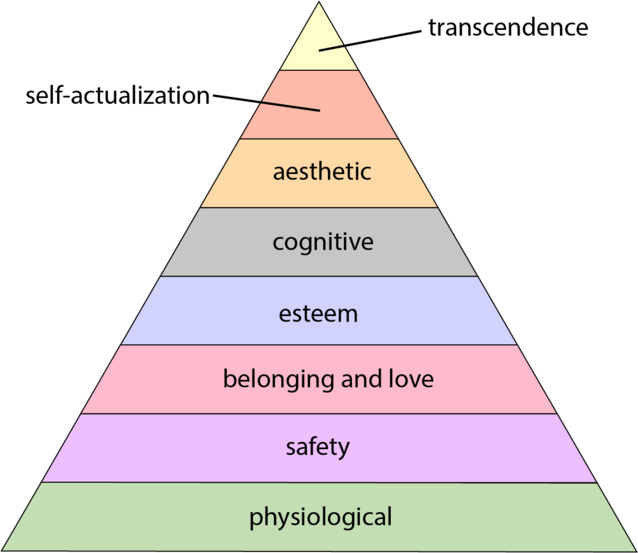
Maslow's pyramid
Bitcoin’s intrinsic value comes from the fact that there is whole ecosystem of developers, businesses, and mining companies and even a country (El Salvador made Bitcoin its legal tender on September 7, 2021) anchored in the real economy and generating economic output across the world.
Bitcoin is already scarce: 18.9 million bitcoins had been issued as of January 2022 only ever be 21 million Bitcoins in existence. Secondly it has proven utility. BTC has been working as a P2P digital currency.
Back to Maslow: the deepest layer of need for our survival are our Physiological needs. In other words, one of our most deeply hardcoded instincts to protect ourselves and save for later what we think we may need in the future. Bitcoin represents arguably the best store of value humanity has ever invented. Accordingly, it addresses these deepest layers of survival mechanisms.
Refugees in Ukraine had to decide between fleeing with valuables or food. And many will have their life’s work torn from them by ruthless passers. But those who held bitcoin code in their head will at least not have their stack of sats stolen. The world understood this use case during wartime In Russian War with Ukraine. A wave of donations was executed on Crypto payment rails including notably via ETH. Russia banned use of crypto to avoid capital flight from the country. Here again Bitcoin operated flawlessly through the tumult.

Bitcoin doesn't care
Bitcoin doesn’t care
In Financial-speakanese (the language of CNBC) It’s the first time the world sees a commodity which has a growing demand yet a totally inflexible supply. It’s a new type of asset.
Yes, currently Bitcoin is still highly volatile, but the protocol has been humming away 99.9879% of the time in its 14 years of existence Bitcoin has gone down only twice (year 1 and year 4) for a total of 14 hours 47 minutes and 9 seconds. That’s as good as any tech giant gets. Furthermore, Bitcoin’ price recovered more than 20 X since the last technical glitch.
Given the superior attributes of Bitcoin relative to other assets
- Absolutely Scarce
- Highly divisible
- Fully and freely portable
- Censorship resistant
- Infinitely durable (unaffected by entropy)
- Easier to audit than any art piece or physical asset.
- Perfect store of value
- Highly liquid
It is not hard to imagine a future where BTC might be commonly pledged as collateral for a traditional loan, in the same way that property, or fine art pieces are used as securities. In fact, some institutions in the USA have already started this practice of BTC back mortgages for Real Estate, to my knowledge since 2022. Because we remain for now made of meat bodies living in the physical world of atoms and gravity, I believe that income production Real Estate will likely always remain at the core of wealth creation. Indeed, I can see a future where Bitcoin becomes common place as a perfect immaculate collateral. There may even come a time when the lender will prefer Bitcoin over property mortgage as security.
More realistically, in the medium term, lenders will probably require a double security: one on the property and one on the bitcoin. And as waves of default will surely occur, smart bankers will opt to seize the better asset (Bitcoin).
Extrapolating on these extraordinary properties, it is possible that over the next 50 years, BTC will become the world’s most desirable form of collateral.
So as a security, Bitcoin may become better property than property.

Law of Abundance mindset
To those who have it shall be given more
The Bible teaches us about good values. Are good values not behavioral, perhaps spiritual, protocols which when followed correctly lead us to positive valuable experiences? It also teaches us that goodness attracts more goodness.
The best assets in the world follow this principle too.
This next statement may sound like a banal truism but it bears pondering: “Scarce & desirable assets tend to disproportionately accrue value over time, because they are more scare and desirable than the alternatives”. It bears repeating: anything that remains scarcer and more desirable relative to another thing, will necessarily attract value over time.

Imbedded Growth and inflation control via Halving
Bitcoin’s immutable protocol of mining was designed such a defined quantity of bitcoin will be released to miners providing work from inception until the year 2140 when the total amount of exactly 21 million BTC will be in circulation.
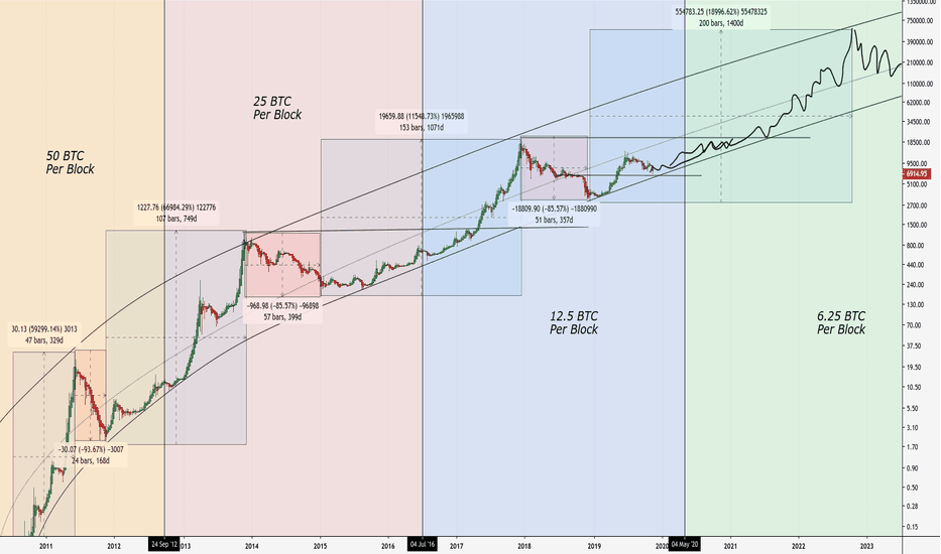
Bitcoin Halving Cycle
Every 4 years, the reward for mining Bitcoin will be cut in half following a logarithmic growth (opposite of an exponential growth) converging toward 21.000.000 BTC and ending there: this is what we call Halving.
So far halvings have taken place.
- 28, 2012
- July 9, 2016
- May 11, 2020
The next Bitcoin halving is scheduled to take place at block 840,000 which is predicted to be on Mar 12, 2024
Because of its superior attributes and progressive adoption many bitcoiners such as myself that are not traders are choosing to Dollar-Cost-Average. It is the practice of investing a fixed dollar amount on a regular basis, regardless of the share price. It’s a good way to develop a disciplined investing habit, be more efficient in how you invest and potentially lower your stress level—as well as your costs.
Buyers like myself and more importantly institutional buyers. For example, in 2022, Fidelity Investments, the largest retirement plan provider in the United States, became the first to add Bitcoin as an investment option in its 401(k) plans. Under their plan, investors will be able to allocate up to 20% of their retirement savings to bitcoin), generate a buying pressure on the asset because we buy in at any price.
The halving is a largely psychological event which rallies the interest of the community. on any average trading day about a million BTC get bought and sold. But currently 900 New BTC are minted per day. So the halving to 450 new BTC will be virtually inconsequential to the supply side.
On the other hand, in Real Estate, Boom and Bust cycles are fairly common, when investors get overconfident and build excessively.
So from a Supply predictability perspective, Bitcoin is Better Property than property.

A self deprecating slogan to describe genius engineering discovery
Hardest asset ever
Brick and mortar enthusiasts like myself understand in their gut that hard assets are good (i.e. valuable) because they are hard. Simply said, if it were easy and cheap to build another at scale 1-to-1 replica of the Eiffel Tower, there would be many more Eiffel Towers in the world. And as a consequence, the Eiffel Tower would not be the most visited monument in the world.
The same can be said about any piece of Real Estate whether the Louvre or a ground floor studio apartment. The fact that hard work is necessary to create something embeds its intrinsic value (Labor hours, cost and choice of materials, artistic or cultural relevance, quality of design etc.).
If it costs a Real Estate developer 180 dollars to build an apartment (including the cost of land), the going rate would be slightly above the 180 dollars, not multiples of that price.
The same applies for Bitcoin, that is why the proponents of proof-of-work (process of minting new coins) ensures good behavior in the market. Miners will tend to keep the coins if the mining cost was above the market price. And they can decide to sell some in the open market when the going price grant them some profit. Else they will go bankrupt in the long run.
Lose Keynesian monetary policy is criticized for its progressive but certain debasement of the currencies. Bitcoin will be immune to that because of its programmatic fixed supply.

Left to their own devices, most people in most cases will cheat for their own benefit. Bitcoin Solves this !
Safedean Ammous author of the Bitcoin Standard puts it like this.
“In the fiat system, you have to earn your money twice. Once, by working for it, then a second time by investing it wisely so that your money is not debased away. If you fail, you will lose value either via currency debasement or via poor investments.” Similar to Real Estate, first, you must acquire the property, then you have to forever maintain and service the asset in good shape so that it keeps it value.
Bitcoin is the first example of any valuable asset which is completely immutable, infinitely so. Even a unique art piece under a glass safe stored in a rarified atmosphere at the Louvre Museum will inexorably deteriorate over time.
So, in terms of durability, bitcoin is better property than property.
A well-built foundation
Conservation of energy
In the first example above of Bob transacting with Alice, the transaction respected conservation of energy in realms of transactions. Which means when I give away a stone, it is gone – not in my possession any more. In other words, the sum of total stones in circulation remains the same. Hence, this is physics and perfected engineering applied to money. Unlike most of the digital realm, when I send you an email, we both have a copy.
In bitcoin when I have 2 BTC and I send you 1, then you get 1 and I have 1 left. You and I can be sure than no group of individuals (elected or not) can EVER create any amount of new BTC for themselves and dilute our holdings.
This is what bitcoin maximalists mean when they write: 1 BTC = 1 BTC. Bitcoin is the only financial tool which is both fixed and immutable. Besides the superior attributes as store of value, bitcoin allows to transact instantly across border with final settlement. It means transaction cannot be rolled back and does not rely on counter party (limits risks & fees).
Our current financial systems are built differently. As strange as it may sound, money can be created out of thin air by central bankers, bringing many distortions to civilization, most notably, inflation – a sometimes slow, but progressive theft of your value. Furthermore, history shows over and over again, that leaders, finance ministers and Central banks, who are able to Change the rules to their advantage, always do. They raise the debt ceiling, the clip the coins, they forbid shorting certain stocks, they seize certain assets from certain groups (the rich, the foreigners, the Jews, The protestants, the Tusti, the Uyguhrs), protect the business of those close to the power center (banks, insurance companies).
The radical new concept of the Scarcity, or the incorruptibility of Bitcoin is hard comprehending the significance of, because it has not ever been ‘traded’ before. But my opinion, is that it will have consequences as profound and compelling as the discovery of electricity. BTC represents the opportunity for a new base layer for the world where rules will be more fair and transparent.
Bitcoin will demonetize Real Estate…Not…
A few Bitcoin enthusiasts claim that Bitcoin will end up demonetizing Gold (which I agree with), bonds (possibly), stocks (I don’t see that happening) and even Real Estate (which I firmly disagree with).
The main claim of these BTC purists is that “the value of assets (ex: Real Estate) will inexorably crash the price of their utility function”. This means that the cost of the house will basically be the cost of land + building material + labor.
As long as civilization exists, there will always exist innate deep-programming territoriality in humans’ beings and people will naturally seek comfort and signal status. As long as human will derive from a home more than pure security, Real Estate will preserve its status as one of the preferred and privileged asset classes. No cyber Metaverse or generational rebellion could ever remove that deep need to possess hard assets in the human experience.
So, what are the Risks?
No intrinsic value
Bitcoin is code, it has no value, it can be copied, it’s not tangible: Back in the 1980’s people said of software the same thing. It is quite clear what happened with none tangible code when it becomes useful. Is an incorruptible software to store value forever basically for free useful?
Are Bitcoin Whales a risk?
Today there are 115 Bitcoin wallets containing over 10.000 BTC of which 4 contain more than 100.000 BTC. What if they act nefariously? What if a whale dumps their coins on the market and crashes Bitcoin price?
This is possible of course but highly unlikely given the fact that, except for MicroStrategy which aggressively bought BTC since 2020, whales were by default early adopters and accrued untold gains by not selling out.
Satoshi Resurrecting
The mother of all whales is an account with a million BTC attributed to Satoshi Nakamoto. For the reasons stated above its unlikely that he would destroy his own creation. Ok but what if he changes the Bitcoin Protocol to his advantage? First of all The bitcoin source code was copied about 16.000 times – it is the base of most every other crypto shitcoin project. Secondly, if push came to shove the code could be forked and preserved in this intact condition. Finally, it is my belief that Satoshi Nakamoto is Dead. One of the first known people he interacted with on blogs and the first to ever receive a 10 BTC transaction in January 13 2009, was an American computer scientist called Hal Finney. Him and Satoshi Nakamoto interacted for a few years (along with many others) until 2010. And the last message ever was on December 12, 2010. Sadly, Hal was diagnosed with ALS in 2009 and died in 2013. I belong to the group of people who believe Hal was Satoshi Nakamoto.
Can governments shut Bitcoin down?
3- Code is speech. In the United States, code is regarded as “protected” speech — software source code which powers bitcoin is protected by the First Amendment. Most Countries in the free world follow the leadership of the United States in this regard.
Secondly, in the case that any jurisdiction will ban Bitcoin, it will simply benefit other countries who remain open to it. It was the case in September when China banned bitcoin mining. BTC was oblivious to that major blow and basically rallied in the nose of China, same was with India, and Pakistan.
Again, because if its perfect portability, one can even argue that Bitcoin will act as form of pacifying tool against autocratic government.
Furthermore, government regulation will bring clarification for the whole industry and is likely to clean out bad actors.
Bitcoin Mining is Polluting
Bitcoin consumes 275 terawatt hours or 0,17% of the global energy produced. It has an estimate 58,9% green energy mix – a higher mix then the greenest country in the world, Germany. In fact, Bitcoin is the leading industry in the world in green energy and offers a location agnostic client for any source of green or waited energy.
Deep ocean mining in the equator (proposed by ocean bit) will offer an great and abundant green source harnessing temperature differential between surface and deep water.
Mining centralization
My biggest concern is honestly the centralization of mining. It is clear that mining bitcoin has become a game of big players and evermore centralized. The halving event reduce the rewards and therefore make it ever more competitive, so only the richest will survive. Luckily, different countries have various sources of abundant energy, including green energy and will surely end up encouraging national bitcoin mining. Frankly, I’m not sure how this will all play out but it’s one thing to keep an eye on. Here again, Deep Ocean Bitcoin Mining in international may be an answer but we are maybe a decade away.
Parting thoughts
The digital property protocol we call Bitcoin has been flawlessly running for 14 years and is being adopted faster than any technology has ever been adopted, faster than mobile phones (!). Both by individuals or now increasingly by institutional investors. The fine-print regulatory framework is going to be defined in the months and years to come. But Bitcoin has never been less risky than today as regulators across the world generally agree on the definition of a Commodity and Digital property. The rollercoaster volatility of BTC that we see and will continue to see in the next decade, as representation of the residual risk, is still priced in. Volatility is a dimension of adoption.
It is my belief and, with my ‘skin in the game’, that Bitcoin will reward brave investors, those who have taken the time to educate themselves, and mustered the courage to take this opportunity seriously.
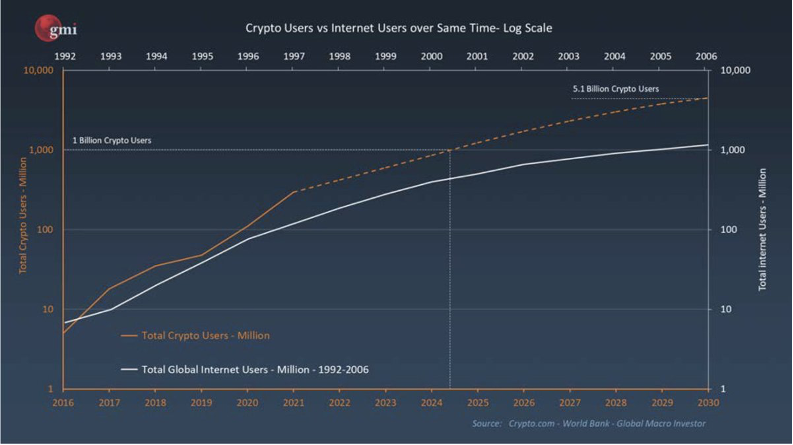
Credit: Raoul Pal : “crypto adoption vs the internet (both starting at 5m users)”
Make Time your friend
Real Estate investors generally tend to be conservative and, at the same time, comfortable with ‘long-game’ deals of a up to a decade or more. We real estate owner and bitcoiners understand that patience and consistence is of the essence. We are filtered out by our willingness to differ present pleasure for future higher gains. And what is money if not a technology for making our wealth today available for consumption for tomorrow.
It is my belief and, with my ‘skin in the game’, that Bitcoin will reward brave investors, those who have taken the time to educate themselves, and mustered the courage to take this opportunity seriously.
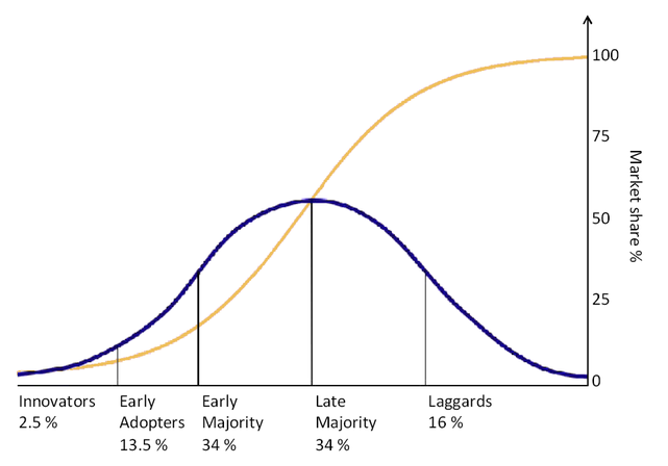
Adoption Curve: we are still so early !
Another estimate made by Creosus a.k.a Jesse Myers in November 2022 is that about 4.000.000 addresses holding more than 0.1 BTC in cold storage exist today. This means 1/20th of 1% of the world has stored BTC. This puts us in the late 80’s in equivalent internet adoption.
In Conclusion
In this essay I attempted to show that in terms of ownership rights, portability, divisibility, as a Collateral, Supply predictability, in terms of durability, bitcoin is better property than property.
To be clear I don’t believe Bitcoin will displace real estate ever. I thing its a new powerful tool for storing value over a long time.
Personally, as a risk-averse long term Real Estate investor by profession, I follow a long-term dollar-cost-averaging strategy of purchasing Bitcoin, with no leverage. I don’t expect to deviate from this strategy anytime soon because it offers the best risk/reward ratio considering time cognitive load (minimal) and average entry price overtime (also minimal). I am striving to convert positive cashflows from Real Estate transactions into more BTC savings. That works for me.
Some people think in term of days and months, we call them Traders.
Some people think in terms of year and decade, we call them Investors.
Some people think in terms of lifetimes and centuries, we call them Savers.
I consider myself somewhere between an investor and a saver. I hope it helps you find what works for you.
A word to the wise: Keep an open mind, keep on learning.
Mostly stack Sats & stay humble, my friends.
Copyright: Hugues Armand-Delille
January, 2023
Berlin, Germany
Support for the page will be greatly appreciated.
PayPal: huguesad@gmail.com